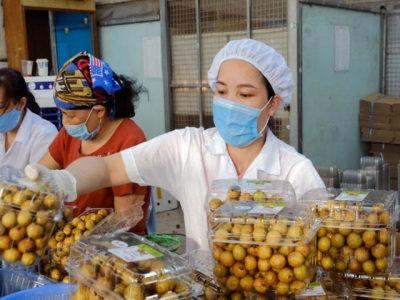Issue of input materials needs solving to improve local agricultural products

The Fruit and Vegetable Research Institute is confident in the technology of processing and preserving agricultural products after harvest, but production of large quantities demands a stable input source.
On the afternoon of July 6, the institute supported preliminary processing of 1.5 tons of longan for Fusa Organic Agriculture Joint Stock Company before this unit exported to the Netherlands.
This is a batch of early T6 longan grown by Hoa Muoi cooperative, residing in Chieng Khoong Commune, Song Ma District, Son La Province. Longan is grown completely according to organic methods and has been granted a VietGAP certificate.
Unlike litchi, the preliminary treatment of longan does not require high color retention.
However, longan shells are thinner and therefore need other preliminary processing methods such as ice immersion and sterilization in a short time to ensure freshness after air transport.
Nguyen Duc Hanh, Deputy Head of the Department of Biophysics, Biochemistry and Post-Harvest Technology, Fruit and Vegetable Research Institute, said: "We have applied many advanced technological processes of the world to help Vietnamese agricultural products meet export requirements, and at the same time prolong the preservation time of vegetables, tubers and fruits".
According to Hanh, each export market has a different requirement; therefore, the Fruit and Vegetable Research Institute always has to update technology in order to support farmers to balance profits.
One of the main difficulties of the Fruit and Vegetable Research Institute in providing post-harvest support is the source of input materials. If agricultural products are not uniform in terms of quality, design and other technical standards, it is difficult to process and preserve them in large quantities.
"If the issue of input materials can be solved, I think Vietnamese agricultural products will increase their competitiveness and go further, being able to enter strict markets," said Hanh.
Sharing the same view with Hanh, Nguyen Thi Thuy Linh, an officer of the Department of Biochemistry, Biochemistry and Post-Harvest Technology said: "The Research Institute of Fruits and Vegetables is partly economically autonomous. Therefore, the institute's processing technology is always customized according to the requirements of each enterprise.
“If there is a specialized area of raw materials with close combination among planting, harvesting and preliminary processing to form a chain of links, I think Vietnamese agricultural products will be more diversified".
As a unit of the Vietnam Institute of Agricultural Sciences under the Ministry of Agriculture and Rural Development, the Fruit and Vegetable Research Institute has reached many achievements in recent years, such as successfully transferring the copyright of 2 Phalaenopsis orchid varieties to Lam Dong Department of Agriculture and Rural Development, successfully selecting Yen Chau mango variety, supporting farmers in Son La Province to cultivate vegetables under the roof, and successfully selecting and creating 2 types of honeydew melon.
Assoc.Prof.Dr. Nguyen Quoc Hung, Director of the Institute, considered these achievements as the first bricks on the road to a responsible agriculture, as Minister of Agriculture and Rural Development Le Minh Hoan had said.
"In fact, Vietnam's agriculture is experiencing great post-harvest losses. Therefore, the Fruit and Vegetable Research Institute will focus on researching and perfecting post-harvest technological processes, helping to improve the trademark of local agricultural products".
Có thể bạn quan tâm
 Agriculture production conversion in drought and saline areas
Agriculture production conversion in drought and saline areas After 3 years of implementing Resolution 120/CP, farmers in the Mekong Delta have had a new production approach and achieved high economic efficiency
 Revive coffee planting soil thanks to organic production
Revive coffee planting soil thanks to organic production Instead of spending hundreds of millions of VND each year buying inorganic fertilizers, many coffee farmers in Lam Dong have applied organic compost
 Growing pepper 'following nature'
Growing pepper 'following nature' Instead of investing in a lot of chemical fertilizers and stimulants to grow plants quickly, Huy Hung Farm grows pepper 'naturally'